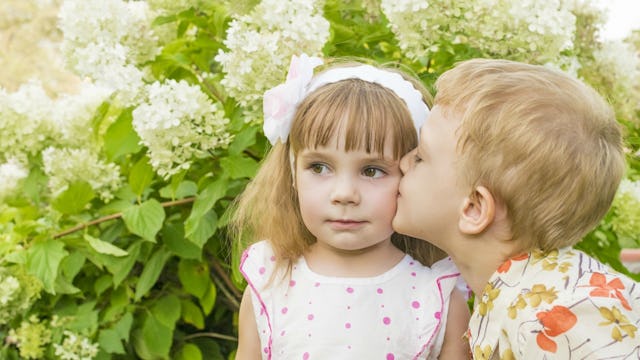Your 'Kissy' Kid Is Not Cute When His Affection Is Unwanted

All of the mothers audibly gasped, shocked at the violence they had witnessed. All of the mothers, except me. I wanted to cheer, to champion that kick-ass little girl. I managed to refrain from screaming, “Yaaas, girl!” But I still can’t stop thinking about what I saw and how it speaks to the culture of consent and our children.
In that week of mommy and me museum camp, I witnessed a sweet 4-year-old boy daily run from child to child, virtual strangers to him, forcibly grabbing them into embraces, attempting to kiss their shocked little faces, ignoring the clear signals these victims were sending that they were uncomfortable, and sometimes, even scared.
Many of the recipients of this unwanted physical attention pushed back vocally, demanding that the little boy “Stop it!” Some cried, some pulled away, and raced to their mothers’ protective arms. And these mothers reacted by looking to one another with grins shining; the “Isn’t that cute! What a little flirt!” message communicated silently.
Not once, not one single time, did this little boy’s mother step in to correct her son, to remind him that unwanted physical attention, no matter the intention, is wrong. Not once did the teacher step in to make that correction. Not once did a parent in that class complain about the unwanted affection that their children were enduring.
And I am embarrassed to say that I held my tongue as well because this little boy’s kisses were, thankfully, never aimed at my daughter. I, too, was a part of the problem, and it has eaten at me since.
So on that final morning of class, when this little boy grabbed a spunky little girl into an unwanted embrace one too many times, she hauled off and popped him in the nose. And he, of course, broke into wails. His mother ran to his side, offering him the comfort he asked for. And Spunky’s mother, what did she do? Well, she apologized profusely to that mini harrasser’s mother. And to top it off, she publicly scolded her daughter for the inappropriate use of her body, for putting her hands on another child.
Irony, anyone? What the hell are we teaching the children who were a part of and witnessed this situation?
If any adult in the room, including me, had stepped in to correct this situation during any one of the tens of times it had occurred earlier, maybe this tiny Muhammad Ali wouldn’t have had to physically defend herself. But instead, those of us who were uncomfortable remained silent to avoid conflict and those of us who saw no problem with this situation, who may actually have found it adorable, stood by and allowed these children to learn a dangerous lesson about consent: that the people who are supposed to teach you right from wrong will stand by and allow children to be, at the very least, made to feel uncomfortable and physically awkward, and at worst, assaulted because the assailant is an adorable kid.
Now, don’t misunderstand me, this was not that 4-year-old boy’s fault. The first time he tried to play kissy face with an unwilling participant, his parent (or teacher, or really, any adult) should have stepped in and taught the appropriate lesson about consent: “We don’t touch people who don’t want to be touched. Period.” Instead, it’s likely that his behavior was reinforced by bystanders by who thought it was cute. And like Pavlov’s dog, this little boy followed the praise and reward.
Right from the start, from the time our children reach consciousness and understanding, we need to begin the lessons on consent. It is essential that we teach our children that their bodies are their own, that they, alone, have the power to give permission for their bodies to be touched or to demand they be left alone. That they have the power to rescind that permission at any time. We must teach them that they need to ask for and receive clear permission before touching someone else.
I don’t force my children to kiss or hug relatives. I encourage them to make those choices based on how they are feeling in the moment and the history and relationships they have with that person. If my kids aren’t into hugs and kisses, they give a high-five. We have frank discussions about who is allowed to see them naked (we, their parents, to help with bathing, dressing, etc., and the doctor when Mom or Dad is in the room). We have frank discussions about touching oneself, about privacy, about what is natural and what is normal.
With all of that in mind, I sure as hell hope that if one of my children is faced with harassment, with physical assault, faced with a situation in which they must rescue themselves because some parent, our society, and/or bystanders have failed to teach the assailant about consent, that they will protect themselves. If that requires them to go a little Ali on some assailant’s ass, well, I hope I’ve taught them how to throw a good punch.